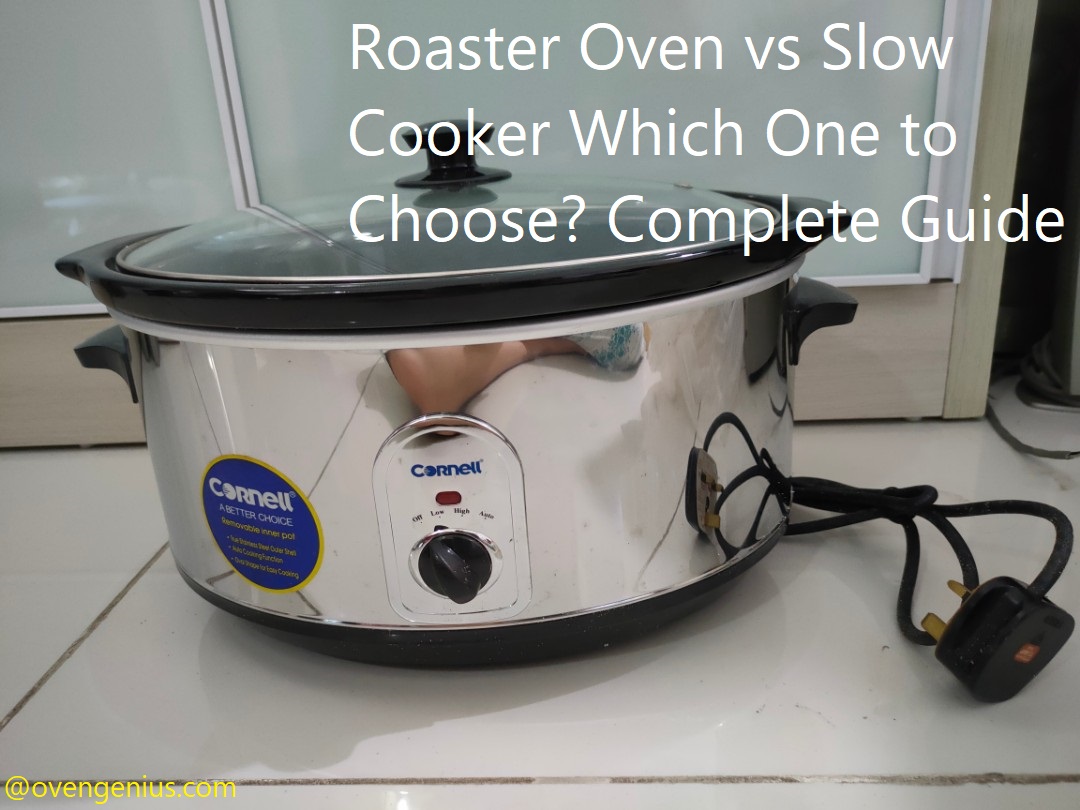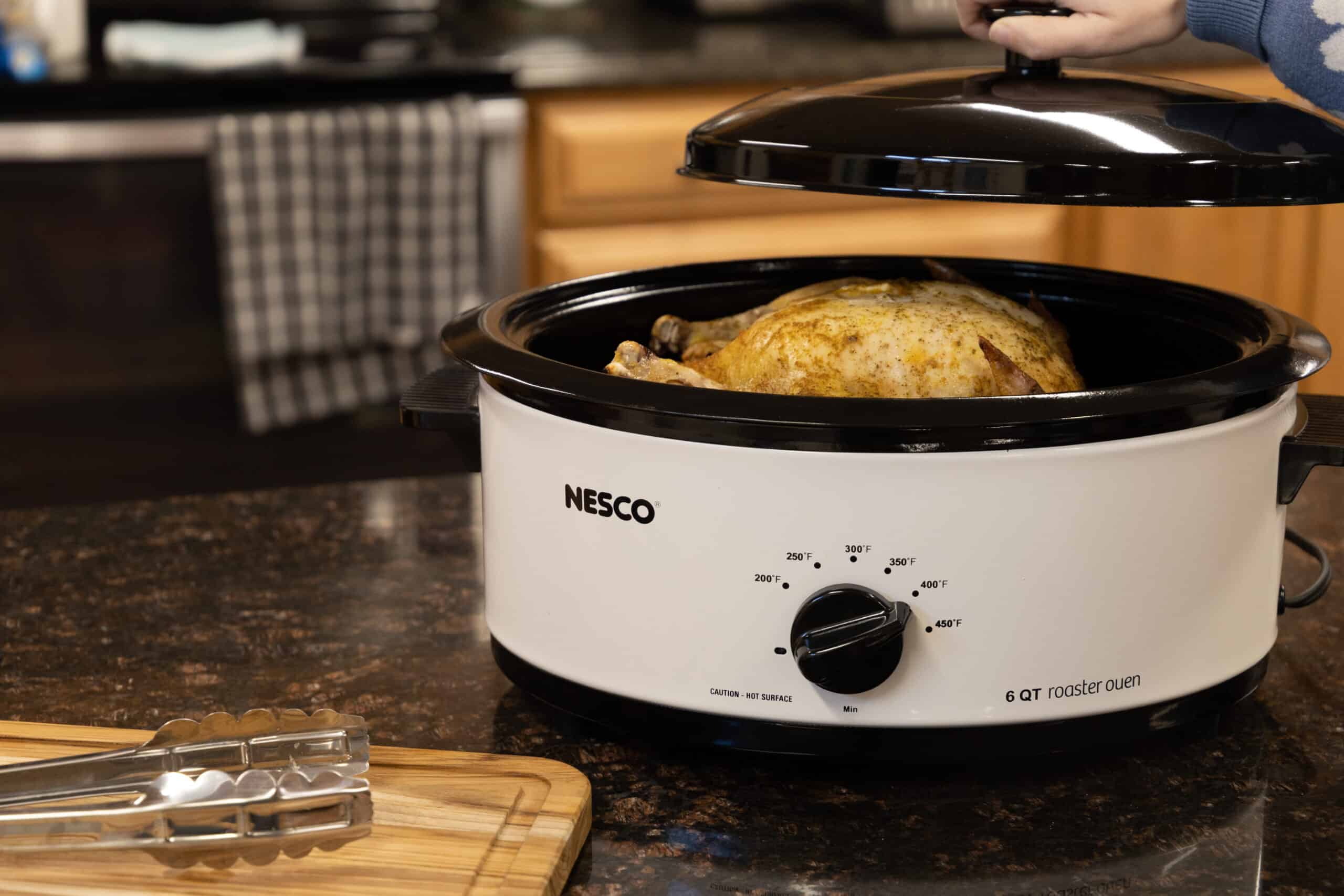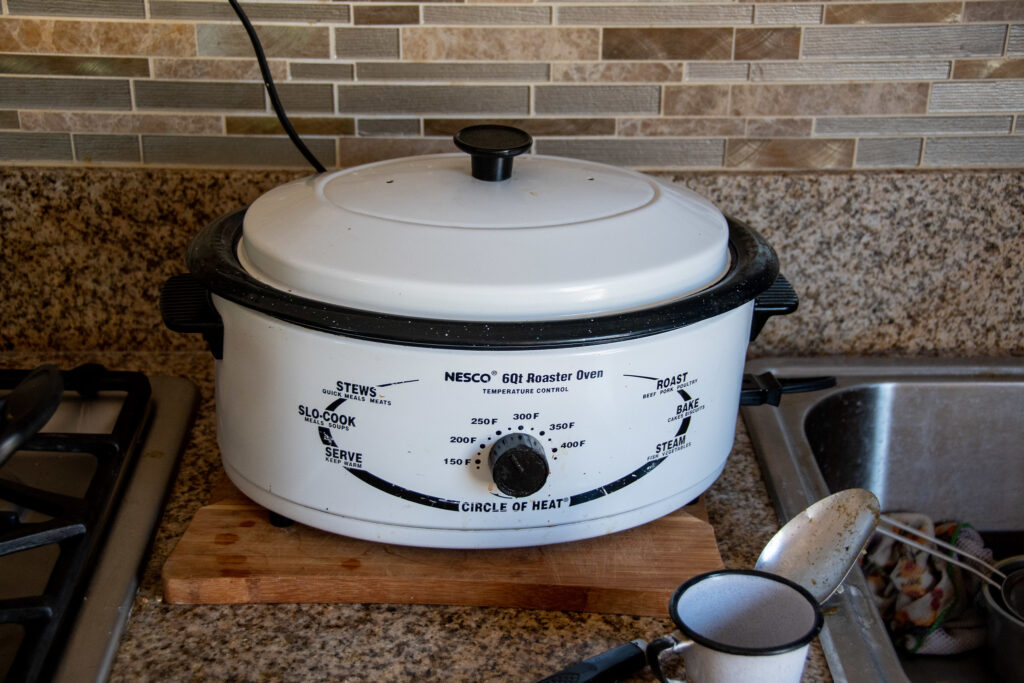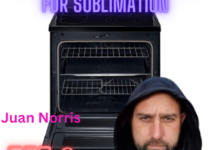Are you confused between a Roaster Oven and Slow Cooker? Trying to figure out which one is right for your kitchen? Don’t worry – this complete guide is here to help.
We’ll break it all down for you, so you know exactly which one of these appliances would be the best fit for your daily cooking needs.
Cooking can be so much fun and a great activity to de-stress after all the hard work at the office. But, choosing the right kitchen equipment can be daunting. In this guide, we will discuss the difference between a Slow Cooker and a Roaster Oven. Both these cooking methods have several similarities but also a few notable differences.
We will explain how each one works, which one is easier to use and provide recommendations on which one to choose depending on your individual needs. Read on to find out everything you need to make an informed choice between these two great cooking gadgets!
Explanation of the topic
When trying to decide between a roaster oven and a slow cooker, it can be difficult to determine which appliance is best for the scenario. To properly choose between these two cooking methods, it is important to understand the differences in their features and capabilities.
A traditional slow cooker is capable of producing slow-cooked dishes at temperatures ranging from as low as “Low” (140F) to “High”(200F). Slow cookers are also capable of holding anywhere from 4-8+ quarts, depending on the particular model. The food will be cooked slowly over an extended period of time in liquid or broth. Slow cookers are ideal for dishes that contain tougher, chewy cuts of meat or require longer cooking times such as stews and soups.
On the other hand, a roaster oven is powered by electricity and can reach up to 450F at its highest temperature level. Most models come with an enclosed pan and lid for easy transport. Roasters offer more versatility than your regular slow cooker because they can also bake food items like cookies, casseroles, as well as roast poultry or whole hams and turkeys! Because they preheat quickly and maintain their heat through insulated walls, they are great when preparing larger meals quickly without having to sacrifice quality.
The type of dish being prepared should be closely considered before deciding on a roaster oven vs slow cooker; both appliances have their own special features that make them ideal for different types of dishes therefore one should consider what type of food they plan on making in order to properly choose the right appliance.

Comparison between Roaster Ovens and Slow Cookers
When it comes to choosing a kitchen appliance for slow-cooking, two options often come to mind: a roaster oven or a slow cooker. Roaster ovens and slow cookers have the same basic purpose of combining ingredients together then cooking them at low temperatures for several hours. However, there are some differences between them that can help you decide which one is right for you.
When comparing roaster ovens and slow cookers, the main difference lies in the way they are heated:
– Roaster Ovens: Roaster ovens use elements located in both the top and bottom of the unit to generate heat for cooking. This makes them more energy-efficient than slow cookers since they can maintain consistent temperatures without having to continuously cycle on and off throughout cooking. This also allows roaster ovens to achieve higher temperatures faster than slow cookers which may be important when needing to start a larger piece of meat or poultry quickly.
– Slow Cookers: Slow Cookers consist of one heating element located on the bottom of the unit which cycles on and off throughout the cooking process in order to maintain consistent temperatures. Because these units keep consistent temperatures at lower levels, they can take longer than roaster ovens when starting up large pieces of meat or poultry as well as when bringing items up to temperature during cooking times such as soups, stews or braises.
Differences in cooking times
When it comes to roaster ovens and slow cookers, the main difference is in the cooking time. Slow cookers are designed to run at a consistent low temperature over a long period of time, while roaster ovens are typically used for shorter periods of time at a higher temperature. Slow cookers generally take between four and twelve hours to produce cooked meals, while roaster ovens can take as little as fifteen minutes to prepare food.
Roaster ovens also have the ability to brown food while they cook, which slow cookers do not. The added ability of browning results in more flavor complexity and depth in the finished product than would otherwise be possible. Roaster ovens also greatly reduce the amount of liquid that needs to be used in and around the food, resulting in a more moist dish overall. Lastly, roaster ovens allow for one-pan cooking solutions which limits cleanup afterwards – something that isn’t possible with most slow cooker recipes.
Differences in cooking methods
The main difference between a roaster oven and a slow cooker is how heat is applied to the food. A slow cooker uses a steady low heat to cook the food over an extended period of time, whereas a roaster oven uses direct radiant heat from above and below, which cooks the food faster but still much slower than traditional stovetop methods.
A slow cooker allows you to set the cooking temperature and leave the food unattended for several hours or even overnight. This makes it a great choice for busy cooks who want to prepare something quickly without sacrificing taste or nutrition. Roasters, on the other hand, can be used for cooking more quickly and with less monitoring as they raise and lower their temperature as needed to ensure your dish is cooked properly. This provides greater precision in cooking certain dishes with minimal fuss.
In terms of temperature range, both roaster ovens and slow cookers offer different specifications depending on what type you purchase; however, most have set low and high settings that allow you to tailor your results according to your recipe or dietary needs. While most recipes call for moderate temperatures (between 170°F – 210°F), some require higher temperatures such as those used in baking breads or meats that need higher levels of searing temperatures. In this case, roasters are better suited because they can reach up to 450°F versus just 250ºF for most slow cookers; however both perform similarly on lower temperature applications such as braising meat or making casseroles.
Finally, another useful feature of roaster ovens compared to slow cookers is their ability of roast whole chickens at high temperatures without drying them out. The smaller size makes them great for small kitchens where there may not be room for two appliances like an electric pressure cooker and slow cooker combos do occur but it may offer even less customization than what one could receive from two separate appliances alone!
Differences in size and capacity
When it comes to choosing between a roaster oven and a slow cooker, the biggest difference to consider is size and capacity. Slow cookers come in a variety of sizes, ranging from 4-quart models for small households to 8-quart models for larger meals that feed crowds. Roaster ovens are usually larger than slow cookers, with the smallest models being about 18 quarts in capacity and the largest models often reaching 30 quarts.
For most people, selecting a slow cooker or roaster oven depends on how many servings they want to prepare. If you are only making dinner for two or three people, then you will likely want to opt for a smaller 4-quart slow cooker. However, if you plan on making large meals like soups and stews that will feed an entire family or even a party of people, then an 18 quart roaster oven makes much more sense.
Of course both types of appliances have their distinct pros and cons that should be considered before making your purchase. Slow cookers can be left unattended while they work so long as they are set on low heat while roasting requires more attentive supervision as roasting times simply can’t exceed four hours due to safety concerns. In addition to this, both appliances have subtle differences in their cooking times which may make one your preferred choice over the other one depending on what type of dish you’re looking to prepare.
Differences in cost
When comparing a roaster oven to a slow cooker, the cost can vary depending on the features and size of each appliance. While both types of kitchen tools offer a convenient cooking method that is energy efficient, slow cookers tend to be less expensive than roaster ovens.
Slow cookers are generally available in sizes ranging from 1.5’’-8 Quart and the price can range anywhere from $13 to $200, depending on the features. Features you may expect come at an additional price include digital timers, locking lids, searing inserts and programmable settings.
On the other hand, roaster ovens come in sizes from 10 quart to 22 quart options and tend to be more expensive than slow cookers. Depending on size and design of a roaster oven you may need to pay between $50-100 or higher for one with additional cooking functions like baking and rotisserie setting. As for larger capacity, business grade roaster ovens can cost up to four hundred dollars or more.

Other factors to consider
When browsing the internet, you may come across a variety of different roasting and slow-cooking appliances. Even though roaster ovens and slow cookers have similar purposes and functions, there are significant differences between them. Plus, both of these appliances come in varying shapes and sizes that offer unique features and capabilities. To help you find which appliance works best for your needs and budget, here are some other factors to consider when making your decision:
Size: Depending on the size of your kitchen counter or storage space, you will want to choose a roaster or slow cooker that fits correctly in your space. Since most families prefer separate appliances for larger batches of food, an average-sized roaster or slow cooker should do fine for most home occasions.
Capacity: Your choice between a roaster oven or slow cooker also depends on what types of dishes you usually prepare. If you frequently entertain large groups or cook food in bulk, then a larger limited-capacity appliance could be more ideal than smaller capacity models. On the other hand, if you are just cooking dishes for yourself or small family meals then consider buying an appliance with smaller capacity options.
Ease of use: When it comes to user-friendliness, both appliances require minimal attention during the cooking process. The automatic time settings make preparing meals with both a breeze compared to other kitchen tools like pots and pans used on traditional cook tops that require constant monitoring while they cook.
Cost: Lastly, there is price to consider when deciding between a slow cooker or roaster oven. Roaster ovens generally cost more upfront since they often come with additional features whereas traditional slow cookers may be less expensive but cost more in electricity bills long-term because they are continuously running for longer periods than the latter. Appliance pull double duty as both at times throughout the day with one appliance serving multiple purposes can help save on costs in both initial investment for equipment as well as ongoing utility bills over time.
Which One to Choose?
When deciding between a roaster oven and a slow cooker, many factors need to be taken into consideration. Depending on your individual cooking needs and preferences, one may be more suitable than the other.
The main differences between a roaster oven and a slow cooker are their size, heat source, temperature control, accessories, ease of cleaning and versatility.
Size: Roasters come in bigger sizes (around 22 quarts), while slow cookers are available in both large (over 10 quarts) and small versions (about 6 quarts). Depending on what you plan to use it for and how many people you’re cooking for, the size will play an important role in deciding which one to go with.
Heat Source: Roasters generate heat from electricity while slow cookers generally generate it through heated metal coils or circles. This may mean that a roaster is able to cook more quickly since it has higher temperatures compared to slow cookers.
Temperature Control: Both of these kitchen tools offer varying levels of temperature control; however roasters tend to offer somewhat finer tuning of the heat settings than slow cookers do as far as temperature range. Roaster ovens also tend to have digital displays which can make them easier to use compared to manual models of slow cookers.
Accessories: If you’re looking for extra features like steam baking trays or built-in rotisseries then roasters may be your best bet as some models come with these extras already included whereas slow cookers don’t have these features as standard offerings. Whether or not these additional features are worth paying extra for comes down to individual preference so consider what type of cooking you plan on doing before making your purchase decision.
Ease of Cleaning: Slow Cookers often require fewer cleanups due their lids being non-removable while most models of Roasters have removable lids that need washing separately from the pot itself; this means that they may require additional time and effort when cleaning after use compared with those without them. It is worth noting though that different brands may have different cleaning requirements which can sometimes offset the time needed so make sure you research accordingly before choosing one over the other.
Versatility: Roaster ovens offer more versatility due their higher temperature ranges compared with those offered by slowing cooker allowing owners to bake or toast food just by switching off the lid—something you can’t do with a slow cooker alone—making them ideal for larger dishes like turkeys or even cakes! On the other hand, Slow Cooker excels at keeping food warm due its lower temperature settings making it perfect for tenderizing tough cuts of meat over long periods of time.
Factors to consider when choosing between a roaster oven and a slow cooker
Deciding between a roaster oven and a slow cooker is largely determined by personal preference and the space available in the kitchen. While they have similar functions and do not have to be mutually exclusive, understanding the differences between them can help you decide which one works best for your needs.
When choosing between a roaster oven and a slow cooker, there are several factors to consider: cooking style, size, features, price, convenience and energy efficiency. Let’s look at each of these in more detail.
Cooking style: Although both appliances are designed to simulate low-and-slow cooking techniques in order to tenderize meat and vegetables, roaster ovens tend to rely more on dry heat than slow cookers. This is because roaster ovens typically rely on convection technology to distribute hot air evenly throughout the cooking chamber, allowing food to cook much faster than with a slow cooker. On the other hand, slow cookers use moist heat which can produce thicker sauces and soups as well as fall-apart meats that are cooked in liquid over an extended period of time.
Size: Roasters come in different sizes – small countertop models that feed several people or larger full-sized models capable of serving a crowd – while slow cookers come in three sizes; small (3–5 quarts), medium (5–6 quarts) and large (7–8 quarts). Generally speaking, roasters take up more counter space due to their larger size. But keep in mind that using an oversized appliance will require additional energy consumption when preheating it before use.
Features: If you want total control over your meals then look for features such as variable temperature controls found on most stand-alone electric roasters rather than those with limited or no temperature control such as crockpots/slow cookers. Variable temperature settings allow you customize your recipes for different meats or side dishes by allowing you to adjust both cooking time and degree of doneness for perfect results every time! Additionally many modern digital versions allow programmable settings so that all you have to do is add ingredients before setting it and forget it until mealtime comes around!
Another important feature would be timer controls found on some electric versions – allowing cooks who prefer shorter cooking times more flexibility when setting meal times without having sacrifice flavor or tenderness of slow cooked food! Finally depending on your tastes – some may even appreciate added browning elements certain models offer which help aid crispiness/texture desired by traditional chef’s followers! If anything – these unique benefits make sure each user get their ‘perfect’ culinary experience!
Questions to ask yourself before making a decision
When deciding between a roaster oven and slow cooker, there are many features and factors to consider. It is important to think about the types of dishes you will cook in the appliance, how often you plan on using it and whether you will use it for entertaining or everyday cooking. Below are some questions to ask yourself before making a decision.
Size: What size roaster or slow cooker do I need? Consider how much food you will be cooking; if it is just for your family or if you also want to entertain; and whether space is an issue since they both come in a range of sizes.
Function: What type of dishes do I plan to cook? Do I need additional features like auto-cook or temperature control? Roaster ovens offer extra functions such as baking, roasting, and broiling which may be useful depending on the type of food that you would like to prepare.
User-Friendliness: How comfortable am I with an appliance with different settings? Roaster ovens offer more options than slow cookers but can be more complicated; therefore it’s important to consider your comfort level when choosing between the two.
Price: Do my budgeting needs match up with available options? While both appliances have a range of prices, knowing what features you need beforehand can help narrow down your search.
Conclusion and final thoughts
When deciding between a roaster oven or slow cooker, it is important to evaluate what features and cooking options are most important to you. If space is an issue and you are looking for a convenient way to prepare meals without heating up the kitchen, then a roaster oven would be an ideal option for you. On the other hand, if flavor and texture are of utmost importance, then a slow cooker may be the preferred choice. The decision ultimately comes down to personal preference as either item can provide delicious results depending on how it is used.
No matter which kitchen appliance you decide upon, remember that both can be used in creative ways to create delicious meals. With proper care and maintenance, either item should serve its purpose with ease, allowing you to enjoy delightful dishes for years to come.

Conclusion
At the end of the day, deciding between a roaster oven and slow cooker ultimately boils down to personal preference, budget and lifestyle. For those who are looking for a small countertop appliance with more options and versatility, a roaster oven may be the right choice.
Slow cookers that have higher wattages will be better at cooking food faster, but still require some planning ahead due to their longer cooking times. On the other hand, roaster ovens are great for dishes that require quick-cooking or browning as well as slow simmering -all with easy temperature control and minimal monitoring.
Ultimately, both are great kitchen tools worth considering if you’re looking to simplify meal preparation or just want to add some variety into your meals.
FAQ’S
Is it better to use slow cooker or oven?
It depends on the type of dish and the cooking method required. Slow cookers are better for dishes that require long, slow cooking times, while ovens are better for dishes that require higher temperatures or browning.
Can I use a roaster instead of a slow cooker?
Yes, a roaster can be used instead of a slow cooker for some dishes, but it may not provide the same level of control over temperature and cooking time.
Why is a slow cooker better than an oven?
A slow cooker is better than an oven for some dishes because it provides low, steady heat over a long period of time, which can result in tender and flavorful meals.
Is a roaster better than oven?
A roaster is better than an oven for some dishes because it provides a larger cooking capacity and can be more energy-efficient. However, it may not provide the same level of control over temperature and cooking time.
Are roaster ovens worth it?
Roaster ovens can be worth it if you frequently cook large meals or want an alternative to using your main oven. However, they may not be necessary for everyone.
What’s better than a slow cooker?
There are several cooking methods that can be better than a slow cooker for certain dishes, including pressure cookers, Dutch ovens, and sous vide machines.
Does food cook faster in roaster oven?
Roaster ovens can cook food faster than traditional ovens because they use a smaller cooking space and often have a fan to circulate hot air.
What is a roaster oven used for?
A roaster oven can be used for roasting meats, baking bread, cooking casseroles, and more. It can be a versatile tool for cooking large meals.
Which is cheaper slow cooker or oven?
Slow cookers are generally cheaper than ovens, but this can vary depending on the brand and model.
Do chefs like slow cookers?
Some chefs enjoy using slow cookers for certain dishes, as they can result in flavorful and tender meals. However, others may prefer other cooking methods depending on the dish and their personal preferences.
See Also:

